- Home
- Hammond Innes
Maddon's Rock Page 18
Maddon's Rock Read online
Page 18
It luffed easily and came round on to the starb’d tack, making for the inlet. Then the sails dropped gently from her mast, the anchor clattered and she swung round, pointing her bows to the ebbing tide that raced under Connel Bridge. I could see Jenny, dressed in jersey and slacks, helping an elderly man to stow the sails. Then the dinghy was pulled up alongside and he began to row her ashore. I didn’t wave. I was excited and wretched all in the same moment. If only things had been different.
She saw me when she was halfway to the shore. She was shading her eyes from the dazzle of the water with her hand. Behind her the Eilean Mor rode gracefully at anchor, her reflection dancing in the water. Suddenly Jenny waved. I waved back.
I went down to the water’s edge and grasped the bow of the dinghy as it beached. She jumped out and took both my hands in hers. “Oh, Jim,” she said. “Is it really you?” Her face, all white with salt, was alight with excitement. “How did you get here? Was it difficult?” And then she laughed. “I’ve got so many questions to ask you.” She turned to the man who was pulling the dinghy ashore. “Mac,” she said, “I want you to meet an old friend of mine. Jim. This is MacPherson, our boatman. He’s my water shadow. He goes everywhere the Eilean Mor and I go.”
The old man touched his cap. He was gnarled and bent with very blue eyes in a dour, weather-beaten face.
She sent him off then and as soon as he was out of earshot, she said, “Jim—did you go to Newcastle?”
I was startled by her question. “Why do you ask that?” I said.
“Daddy said you would,” she replied. “He’s convinced that you escaped because of that?” She looked up at me quickly, her grey eyes enquiring. “You did know that Halsey was fitting out a salvage tug at Newcastle to lift the Trikkala’s bullion, didn’t you?”
“Yes,” I said.
“Was that why you escaped?”
I nodded.
“So Daddy was right.” Her eyes danced with excitement. “Did you go to Newcastle? Did you find anything out? Oh, do tell me—what did you discover?”
“That the Trikkala never sank,” I told her.
Her mouth fell open with astonishment. “Never sank.” Then she laughed. “Oh, Jim, you’re fooling.” Then she gazed at me seriously. “You meant what you said, didn’t you?” She was puzzled, groping for the truth. ‘’The Trikkala never sank,” she repeated slowly, unbelievingly to herself. “Who told you that?”
“Rankin,” I said. “We beat him up and got the truth out of him.”
Nothing would content her then but I must sit down with her on that pebble beach and tell her the whole story.
When I had finished, she sat silent for a moment. It was then I discovered that all the time I had been talking I had been holding her hand in mine. “It’s unbelievable,” she whispered. “To send those men to their death like that. I can’t believe it, Jim. It’s as though you’d told me he made them walk the plank. And yet it explains all those little things we couldn’t understand. Even so, I can’t believe a man would really do a thing like that.”
“It’s true enough,” I said. “No good my going to the police with the story, is it?”
She shook her head. “No,” she said. “I believe you because I know you and know the circumstances. But the police wouldn’t believe you. It’s too fantastic.”
“The truth is often fantastic,” I said.
“Yes,” she said. “But not that fantastic. The authorities would say you’d made it up. Rankin would swear he said the first thing that came into his head to save himself from being killed. You’ll see—to-morrow the papers will have a full story of how he was beaten up by two escaped prisoners in revenge for bringing the charges. All the evidence would be against you. The Trikkala crowd would hang together just as they did at the Court-Martial.” She looked at me suddenly, her grey eyes level and serious. “Jim,” she said, “we’ve got to get proof.”
I could have kissed her for saying “we” as though the problem were hers as much as mine. And as though she guessed what was in my mind she gently withdrew her hand.
“There’s only one way I can get proof,” I said.
“Yes,” she said. “Only one way. Where is Maddon’s Rock?” she asked.
“Near Bear Island, Rankin said,” I replied. “That’s just south of Spitzbergen.”
She sat thoughtfully sifting pebbles through her fingers for a moment. “It’s a bad sea area up there,” she said. And then: “When’s Halsey due to sail?”
“The 22nd of April,” I replied. “But he may get nervous and advance his sailing date.”
“And to-day’s the 17th of March,” she murmured. “If you could bring back some of the bullion, that would be proof that even the dimmest-witted official would understand.” She turned to me and said hesitantly, “Jim, was that why you came here?”
“How do you mean?” I asked.
“Because you wanted me to lend you the Eilean Mor.”
I stared at her. “I—I am afraid I had some idea like that,” I said hesitantly. “You see, Jenny, I didn’t know anyone else who had a boat who’d stand by me. But I thought——” I stopped them. Her eyes were veiled and she turned away.
“Yes,” she said. “I’ll let you have the Eilean Mor.” Her voice was flat and she was staring out to where the bare masts nodded gently against the setting sun.
I thought she was thinking of the terrible seas through which the little ship would have to batter her way. I knew she loved the boat. She suddenly scrambled to her feet. “Come on,” she said. “We’ll go and have a look at the charts. The Admiralty very kindly left me with a complete set for this area. I’d like to see exactly where Maddon’s Rock is.”
She was tugging at the dinghy. I got up and together we pulled it down to the water. Then I rowed her across to the Eilean Mor. It was a sturdy little vessel, very neat and well cared-for with white paintwork and gleaming brass. As I followed her across the deck I experienced that wonderful sense of freedom that a ship of whatever size gives.
She took me aft to the little wheelhouse. From a locker under the chart table she produced a stack of Admiralty charts. “There you are,” she said. “You look through those. I’ll see if I can find a book that gives the danger spots of the north. I’ve got one here somewhere.”
I began to run quickly through the dusty charts. At length I found the one I wanted. Bear Island. Jenny suddenly interrupted my search for Maddon’s Rock. “Here we are,” she said. “I’ve found it.” She had a book open in her hands. “Latitude 73.56 north, longitude 03.03 east,” she read. “Would you like to hear what it says about the Rock?”
“Yes, read it,” I said. “And I’ll try to locate it on the chart.”
“’Fraid you’re not going to like it,” she said. “Maddon’s Rock,” she read. “A lonely, rocky island inhabited at certain times of the year by a variety of seabirds. Little is known about it. Landings have been made on it on less than a dozen recorded occasions. Ships will do well to avoid this area. Heavy seas run here throughout the year and the island and the reefs round it are mostly hidden in spray. The extent of the reefs is not known. The area has only been superficially charted. Drift ice can be expected in the winter. That’s all. Sounds a pleasant spot, doesn’t it?”
“Not too good,” I agreed. “That’s probably why they chose it. Here we are,” I said. “I’ve found it on the chart. It’s just in the Barents Sea and a good 300 miles inside the southern limit of drift ice.” She leaned over my shoulder as I marked the spot with a pencil. “Thank God it’s spring, not winter,” I said. Then I straightened up. “And you’ll really let me have the boat, Jenny?” I asked. I thought the account of the place might have made her change her mind. “I mean, you do realise that—you may never see her again?” I added.
She was looking at me with a strange expression in her eyes. “Yes,” she said. “I realise that.” She hesitated, and then said quickly, “You can have her, Jim. But on one condition.”
She loved the boa
t. I knew that. And when she gave it to me like that, I felt staggered at her trust in me. I took her hand in mine. “You really are a pal, Jenny,” I said. “I don’t know when I’ll be able to repay you. But I will. And if we find the Trikkala, I’ll claim salvage—then I really will be able to repay you.”
She took her hand away. “You haven’t heard my condition yet, Jim,” she said.
“I’ll accept any conditions—you know that.” I was so excited by the prospect of actually having the chance to beat Halsey to Maddon’s Rock that I would have agreed to anything.
“I hope so,” she said doubtfully.
“Well, what is your condition?” I asked.
“You’ll go in charge of the expedition, of course,” she said. “But I want to put in my own skipper and crew.”
“Your own skipper and crew?” I echoed. “But where will you find anyone to go on a madcap expedition like this? Besides, how will we explain—I mean they’ll want to know who Bert and I are and——”
“Not my skipper,” she interrupted.
“Well, who is he?” I asked. “A local man?”
She shook her head. “No,” she said. And then suddenly looking straight at me—“I’m going to skipper her myself, Jim,” she said. Her tone was flat, decisive. She hurried on: “MacPherson will come in charge of the engine. He’s been a ship’s engineer since he was a boy.”
I was staggered. “But—Jenny, you’re not serious?”
She was though. I could see it in the set of her firm jaw, the level look of her grey eyes. She was serious all right. I tried to argue her out of it. But all she said was, “You need a crew of four on the Eilean Mor. You know that. Anyway, that’s my condition.”
“But, Jenny,” I said, “you can’t come on a trip like this. There’s your father——”
“I’ll settle it with my father,” she interrupted. I started to argue again, but she cut me short: “Either I come as skipper—or you don’t get the boat,” she said.
“You mean that?” I asked. I felt dispirited.
“Yes,” she replied.
“Then there’s no alternative,” I said. “I’ll have to give myself up and just hope that the authorities will believe what I tell them.”
“You know they won’t,” she said.
“Yes, but what else can I do?”
She put her hand on my arm. “Jim, I’m offering you a boat and a crew,” she said.
“Oh, don’t be silly,” I said. I felt exasperated. To be offered the means I needed and then for the offer to be coupled with a condition I could not accept.
She said, “If you give yourself up I shall sail for Maddon’s Rock myself.”
I looked at her quickly. That expression was back in her eyes. Something I could not understand—could not be sure of. “Why?” I asked.
“Why?” She shrugged her shoulders.
I caught her hand. “Yes—tell me why. Why would you do that?”
She took her hand away and bent over the chart. “Just for the hell of it, I suppose.”
I caught her shoulder then. “That’s not the reason.” My voice sounded harsh.
“Yes, it is,” she said. “I like taking risks. If you’re scared to take me to Maddon’s Rock, I’ll go myself.”
I stared at her. “I believe you would, too,” I said.
She pushed the hair out of her eyes and looked at me. “Yes” she said, “I would. Now, are you accepting my condition?”
I said, “All right—if your father agrees.”
She seemed satisfied with this and we went back to the house. It never occurred to me that her father would agree to her going on such a dangerous expedition. But that night when Jenny had gone to bed he produced a bottle of old liqueur whisky. He sat over his glass for a while, staring into the fire. At length he turned to me. “You’ve heard Jenny’s condition?”
“Yes,” I said. “I told her I’d accept—provided you agreed.”
“Aye.” He nodded. “Well, I agree,” he said suddenly.
“But, good God!” I said. “You don’t realise the danger.”
He chuckled. “Och, yes I do,” he said. “But there’s no holdin’ Jenny when she’s the bit between her teeth. She intends to come with you and there’s an end of it. She always was a headstrong lass. She’s as wild as her mother was.” He turned back to the fire and began to chuckle to himself. “I mind the first time her mother and I worried about her. She’d smuggled herself on to the MacLeod’s boat when they were away to the fishing. Gone more than thirty hours she was and her only seven years old. After that it was just one thing after another until we ceased worrying about her. Yes, she was always a madcap.” He looked up again. “But then you see, the way I look at it is you can be as careful of yourself as you like and then get killed crossing the road. And there’s no fun in life if you’re always worrying about whether it’s safe or not.” He got up to refill our glasses. As he handed me mine he suddenly put his hand on my shoulder as he’d done that afternoon. “I like you, my boy,” he said. “You’ve got guts and you’re no fool. What’s more, I believe your story. I don’t pretend to understand the nature of this man, Halsey. But I know this, I’ll do what I can to help you come out the winner. And I’ll even trust Jenny to you.” He chuckled as he sat down. “But for you she wouldn’t be alive now, anyway.”
And so the matter was settled for me. Jenny came as skipper. At breakfast next morning she had a smug little grin on her face. I still didn’t like it. It was bad enough going up there myself in a 25-ton ketch. But to be responsible for her life as well. However, her enthusiasm was infectious. She and her father went at the preparations like a couple of children planning an outing. There was plenty to do—stores to be acquired for three months, a second suit of sails, storm sails, Diesel oil for the engine, spare rigging, ropes, tools, fishing tackle, oilskins, sheepskin duffle coats. Her father financed us, but it wasn’t easy to get these things in restricted, regulated, rationed Britain.
It took us nearly three weeks to acquire all the things that we regarded as absolute essentials for a voyage of this nature in such a small boat. Bert and I could do little, for we dared not risk being questioned. Most of the stores and equipment were acquired by Jenny and her father. Jenny knew her way about Oban and Tobermory. She wheedled some of the stuff out of the Navy. The thing that really stumped us for a time was Diesel oil. But we got it in the end from a Dutch freighter that put into Oban during a storm.
Those three weeks were as happy as I could remember for a long time. I took the Eilean Mor out most days to get the feel of her and to teach Bert the rudiments of sailing. She was easy to handle and rode a rough patch well. The more I saw of her, the more confident I felt that we had at least a chance. Even Bert, a landlubber if ever there was one, began to regard her with respect. In the evenings we’d discuss the successes and failures of the day. But always there was something good to report; Jenny had managed to get some tinned meat or her father had persuaded some firm to let us have the clothing we needed. Till finally the day came when we’d everything that we could reasonably want. I could have wished for a radio transmitter, but since none of us knew anything about it, perhaps it was just as well.
On the afternoon of Friday the 14th of April we took the Eilean Mor into Oban and filled up her tanks with Diesel oil. Two great 40-gallon drums were lashed to her decks. Below, everything was stowed and packed. Even our quarters were cramped because they had been invaded by our provisions. God knows where it had all come from. But there it was. And now the final snag had been over-come. We had got our Diesel oil.
That evening Jenny and I strolled down to the loch and along the road under Connel bridge till we could see the Eilean Mor lying under Dunstaffnage Castle. “There, doesn’t she look lovely?” she murmured. She had her arm in mine and her face looked dreamy as she gazed out to her boat.
“Yes,” I said, “she looks lovely.”
Everything was very still. There was no sound except for the weird cry of
an oyster catcher down by the shingle strand. The water was flat and silvery. The Eilean Mor looked like a toy ship on a sheet of glass. She had her bows pointed to the north as though she were eager for the adventure. Out beyond Dunstaffnage Castle was the island whose name she bore. Beyond, the hills had all gone purple in the evening light. They seemed remote, but friendly—the hills of Mull, Morven, Ardgour, Moidart and in the far distance, the hills of Skye. To-morrow, early, we should glide out from the shelter of those hills, through the Sound of Mull, up past Skye, through the Little Minch to the Hebrides. Then we should turn nor’-nor’-east past Cape Wrath and the Shetlands and the Faroes, out into the unknown. I wondered whether we should ever see those friendly, sheltered lochs again.
“Isn’t it wonderfully still,” Jenny murmured. “I love to come here and look at Dunstaffnage when it’s so still you can see the castle’s reflection clear in the water. The world seems so at peace then.” She suddenly turned her face to me. “I feel—you know—like one does when one is very happy—afraid it won’t last.”
I was looking down into her eyes. I felt tenderness and longing fused in my blood. “Are you happy, Jenny?” I asked and my voice sounded hoarse and strange.
“Yes, Jim,” she answered, meeting my gaze. “Very happy.” Then she looked away towards the Eilean Mor again. “But——” She hesitated.
“Scared?” I said.
She shook her head, laughing. “Just a funny feeling inside.” She was still looking out across the loch. “I wish the Barents Sea was calm and still like this,” she said.
“If it were, they wouldn’t have beached the Trikkala there,” I said. “They chose Maddon’s Rock because there was little likelihood of anyone landing on it.” I was looking at the little vessel lying so quiet and at home in that backwater. “She looks sturdy enough down there,” I said. “But out beyond the Faroes we’ll hit some pretty big seas. I hope she’ll seem as sturdy then.”

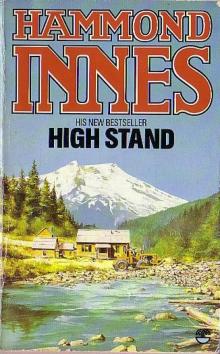 High Stand
High Stand The Doomed Oasis
The Doomed Oasis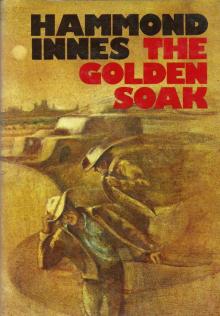 Golden Soak
Golden Soak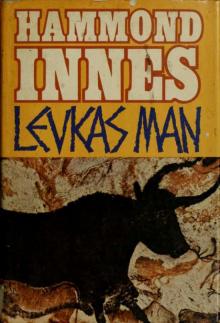 Levkas Man (Mystery)
Levkas Man (Mystery) The Strange Land
The Strange Land Dead and Alive
Dead and Alive Attack Alarm
Attack Alarm The Strode Venturer
The Strode Venturer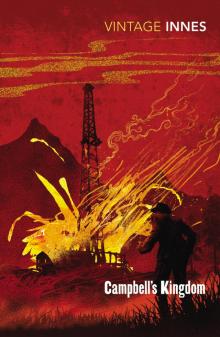 Campbell's Kingdom
Campbell's Kingdom North Star
North Star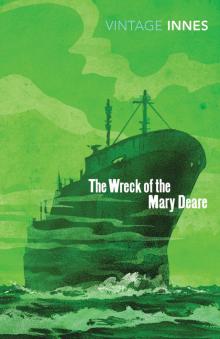 The Wreck of the Mary Deare
The Wreck of the Mary Deare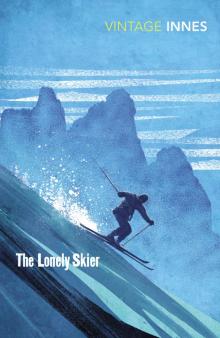 The Lonely Skier
The Lonely Skier The Black Tide
The Black Tide The Trojan Horse
The Trojan Horse Medusa
Medusa Air Bridge
Air Bridge Maddon's Rock
Maddon's Rock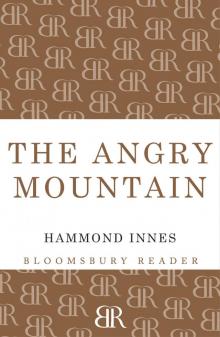 The Angry Mountain
The Angry Mountain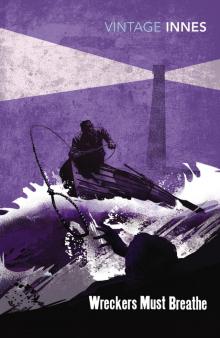 Wreckers Must Breathe
Wreckers Must Breathe Solomons Seal
Solomons Seal The White South
The White South